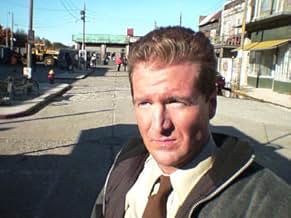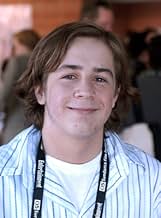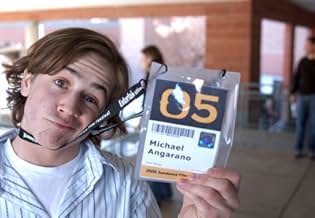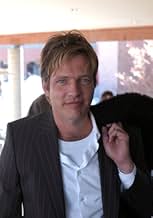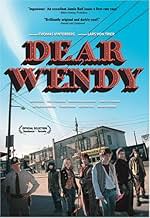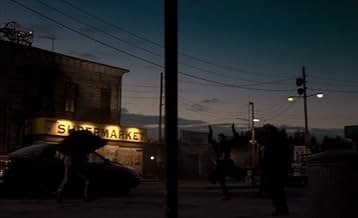IMDb-BEWERTUNG
6,5/10
10.622
IHRE BEWERTUNG
Ein kleiner Junge in einer namenlosen, zeitlosen amerikanischen Stadt gründet eine Bande von jugendlichen Außenseitern, die in ihrer Liebe zu Waffen und ihrem Ehrenkodex vereint sind.Ein kleiner Junge in einer namenlosen, zeitlosen amerikanischen Stadt gründet eine Bande von jugendlichen Außenseitern, die in ihrer Liebe zu Waffen und ihrem Ehrenkodex vereint sind.Ein kleiner Junge in einer namenlosen, zeitlosen amerikanischen Stadt gründet eine Bande von jugendlichen Außenseitern, die in ihrer Liebe zu Waffen und ihrem Ehrenkodex vereint sind.
- Auszeichnungen
- 1 Gewinn & 5 Nominierungen insgesamt
Empfohlene Bewertungen
"Dear Wendy" comes from the talents that brought us "Festen" and "It's All About Love" (both written and directed by Thomas Vinteberg), "Dogville," "Dancer in the Dark" and "Breaking the Waves" (written and directed by Lars Von Trier). They have collaborated on Dear Wendy, with Vinteberg at the helm and penned by Trier.
This is my favorite kind of movie; it begins with a "what if..." premise, which the storytellers follow with relentless commitment. In this case, the premise is "what if some misfit kids fell in love with their guns." Well, they'd give them names, they'd practice shooting and have a secret clubhouse, they'd study the famous gun-toting heroes of old, and the relationship they have with their weapons would become a mirror for their relationships with the world. All of which are pursued beautifully in the film.
Quite a few American movie critics read this film as a critique of American society, and they resent a European making a film about small-town America. An oft-vented complaint is that Trier has no business criticizing a country which he's never actually visited. I don't think, however, that this is ultimately a film about guns; the relationship these kids have with their guns is simply a unique window through which the filmmakers have chosen to show us the rich inner lives of the protagonists. They could have used a dysfunctional family (Festen), or movie musicals (Dancer In The Dark) or a tolling church bell (Breaking The Waves) to show us that world - but in this case it's guns.
Within the limits of the film medium - 10,000 words of dialog and around 140,000 frames of film - the choices of the filmmaker often revolve about what to leave OUT rather than what to put IN. This is a film that could be used as a textbook for economists. The script is tight - not a word out of place, although the narration feels conversational and casual. A film about child misfits and their guns could easily follow thematic red herrings all over the place in pursuit of social commentary, but "Dear Wendy" is utterly restrained - in spite of the "loaded" subject matter. On the cutting room floor are social commentary, cliché, and many of the cinematic crutches which Trier and Vinterberg rejected in their Dogme 95 days.
Any film lover who cares to see a film utterly committed to its premise, a film made with economy and efficiency, a film full of sweet irony, a film of deceptive simplicity, would do well to check out "Dear Wendy."
This is my favorite kind of movie; it begins with a "what if..." premise, which the storytellers follow with relentless commitment. In this case, the premise is "what if some misfit kids fell in love with their guns." Well, they'd give them names, they'd practice shooting and have a secret clubhouse, they'd study the famous gun-toting heroes of old, and the relationship they have with their weapons would become a mirror for their relationships with the world. All of which are pursued beautifully in the film.
Quite a few American movie critics read this film as a critique of American society, and they resent a European making a film about small-town America. An oft-vented complaint is that Trier has no business criticizing a country which he's never actually visited. I don't think, however, that this is ultimately a film about guns; the relationship these kids have with their guns is simply a unique window through which the filmmakers have chosen to show us the rich inner lives of the protagonists. They could have used a dysfunctional family (Festen), or movie musicals (Dancer In The Dark) or a tolling church bell (Breaking The Waves) to show us that world - but in this case it's guns.
Within the limits of the film medium - 10,000 words of dialog and around 140,000 frames of film - the choices of the filmmaker often revolve about what to leave OUT rather than what to put IN. This is a film that could be used as a textbook for economists. The script is tight - not a word out of place, although the narration feels conversational and casual. A film about child misfits and their guns could easily follow thematic red herrings all over the place in pursuit of social commentary, but "Dear Wendy" is utterly restrained - in spite of the "loaded" subject matter. On the cutting room floor are social commentary, cliché, and many of the cinematic crutches which Trier and Vinterberg rejected in their Dogme 95 days.
Any film lover who cares to see a film utterly committed to its premise, a film made with economy and efficiency, a film full of sweet irony, a film of deceptive simplicity, would do well to check out "Dear Wendy."
Thomas Vinterberg has finally reemerged from the disaster that was "It's all about love", and with help from compatriot Lars Von Trier he has delivered a hugely original and entertaining film. The story evolves around Dick - a small town loser who feels confident by holding a gun. Seeing this, he creates a group "the Dandies" of fellow gun-fanatics. Violent as it may seem, the point of the group is pacifism - to obsess with guns, but NOT TO USE THEM. Yet when ex-criminal Sebastian joins the group tensions emerge, and Dicks ego and his gun-obsession becomes a deadly cocktail. The story is absolutely outrageous, but Vinterberg, realizing this, gives the film a warped, almost giddy, feel. This actually complements Von Trier's screenplay better than the latter's ultra-realistic style, and prevents the film from becoming moralizing. The only real drawback of the story is the slow start and the dialog, which at times has difficulty hiding the fact that it has, in fact, been translated from Danish into English. Nevertheless, a strong comeback for Vinterberg - let's hope he can do some more serious stuff as well.
First of all Dear Wendy is a tribute to Kubrick: We have the gang from A clockwork Orange, the gun named Lyndon (and the ancient guns) from Barry Lyndon. And there are more subtle references: a chart from one of the bullets reads Full Metal Jacket, etc.
Although directed by his friend Vinterberg the story is written by von Trier and bears all the marks of a von Trier-movie, but this time it is deeply drawn up in irony. A typical Von Trier-story always watches like literature: idealist gains strength from his beliefs but is confronted by the real world (in this case an ex-con), his beliefs are shaken and self-imposed rules are broken. And enter the tragedy.
The US-setting fits the teasing we are now familiar with from von Trier but the wider meaning is much more universal and it raises several interesting questions. Can a society be free of gun violence when people have guns readily available (US vs Switzerland)? Is gun culture and adoration a wider problem than guns themselves? Or do people need guns in order to rise against any form of eventual dictatorship? What does pacifism mean?
This is a very refreshing movie from Vinterberg-von Trier. It is an interesting study in irony and gun culture with good camera-work from Anthony Dod Mantle and interesting special effects. Would certainly have made a splash and controversy at Cannes.
Although directed by his friend Vinterberg the story is written by von Trier and bears all the marks of a von Trier-movie, but this time it is deeply drawn up in irony. A typical Von Trier-story always watches like literature: idealist gains strength from his beliefs but is confronted by the real world (in this case an ex-con), his beliefs are shaken and self-imposed rules are broken. And enter the tragedy.
The US-setting fits the teasing we are now familiar with from von Trier but the wider meaning is much more universal and it raises several interesting questions. Can a society be free of gun violence when people have guns readily available (US vs Switzerland)? Is gun culture and adoration a wider problem than guns themselves? Or do people need guns in order to rise against any form of eventual dictatorship? What does pacifism mean?
This is a very refreshing movie from Vinterberg-von Trier. It is an interesting study in irony and gun culture with good camera-work from Anthony Dod Mantle and interesting special effects. Would certainly have made a splash and controversy at Cannes.
I liked "Dear Wendy". It was well photographed, had good cast and the rocking soundtrack provided the light icing on a film that is both sad and happy from the inside.
It is a bit puzzling that this film has been seen as anti-American propaganda. It does criticise the American values - but so do many American films that are hardly described as anti-American. The message is even softened by placing the film in surreal, small mining town that is so detached geographically that you can almost feel the fiction. In some sense it bears resemblance to the village set on Brechtian stage in "Dogville" (compare for example the "stageness" of main street) by Lars von Trier, whose touch can be seen in "Dear Wendy", too.
It can be also seen as an anti-gun lecture - but that is just one perspective to it and in my opinion also possible to ignore.
The only turnoff is the somewhat annoying narration by the main character, that explains too much and leaves less for the viewer to ponder. I might be also giving one star too much, because the end scene, where the film picks up the pace left such a strong impression on me, and not just because of being so well shot action.
It is a bit puzzling that this film has been seen as anti-American propaganda. It does criticise the American values - but so do many American films that are hardly described as anti-American. The message is even softened by placing the film in surreal, small mining town that is so detached geographically that you can almost feel the fiction. In some sense it bears resemblance to the village set on Brechtian stage in "Dogville" (compare for example the "stageness" of main street) by Lars von Trier, whose touch can be seen in "Dear Wendy", too.
It can be also seen as an anti-gun lecture - but that is just one perspective to it and in my opinion also possible to ignore.
The only turnoff is the somewhat annoying narration by the main character, that explains too much and leaves less for the viewer to ponder. I might be also giving one star too much, because the end scene, where the film picks up the pace left such a strong impression on me, and not just because of being so well shot action.
I went into this film extremely hesitant. I don't know Vinterberg well, but I do know there isn't much about Lars that I like at all. Top that with a subject matter that I'm rather sensitive about as well. But the film was beautifully filmed and the performances were enjoyable. I enjoyed all of it. I disagree with critics who say the film attacked America or had a heavy-hitting message in it. I think it's subtler than that. For me it was the big surprise of Sundance 05. Rich and fun. In the script, the characters were twice as old as those in the film, and I think Vinterberg made a wise choice in changing that. What is powerful in a teenager can look dorky in a 30-something.
Wusstest du schon
- WissenswertesIn Lars von Trier's script, the main characters were in their 20s. Director Thomas Vinterberg decided to change it, so they became children instead. Lars von Trier later stated that he thought the age change was a brilliant idea.
- PatzerThe plan of Electric Square labels "CENTRE POLE" using the British rather than the American spelling. The film was shot in Denmark and Germany rather than in West Virginia, USA.
- VerbindungenFeatured in Letters to Dear Wendy (2005)
- SoundtracksShe's Not There
Written and Performed by The Zombies
Zombies Heaven, "Begin Here & Singles" (c)
Courtesy of Marquis Enterprises
Top-Auswahl
Melde dich zum Bewerten an und greife auf die Watchlist für personalisierte Empfehlungen zu.
- How long is Dear Wendy?Powered by Alexa
Details
- Erscheinungsdatum
- Herkunftsländer
- Offizielle Standorte
- Sprache
- Auch bekannt als
- Calles peligrosas
- Drehorte
- Produktionsfirmen
- Weitere beteiligte Unternehmen bei IMDbPro anzeigen
Box Office
- Budget
- 50.000.000 DKK (geschätzt)
- Bruttoertrag in den USA und Kanada
- 23.106 $
- Eröffnungswochenende in den USA und in Kanada
- 8.222 $
- 25. Sept. 2005
- Weltweiter Bruttoertrag
- 607.229 $
- Laufzeit
- 1 Std. 45 Min.(105 min)
- Farbe
- Sound-Mix
- Seitenverhältnis
- 1.66 : 1
Zu dieser Seite beitragen
Bearbeitung vorschlagen oder fehlenden Inhalt hinzufügen


